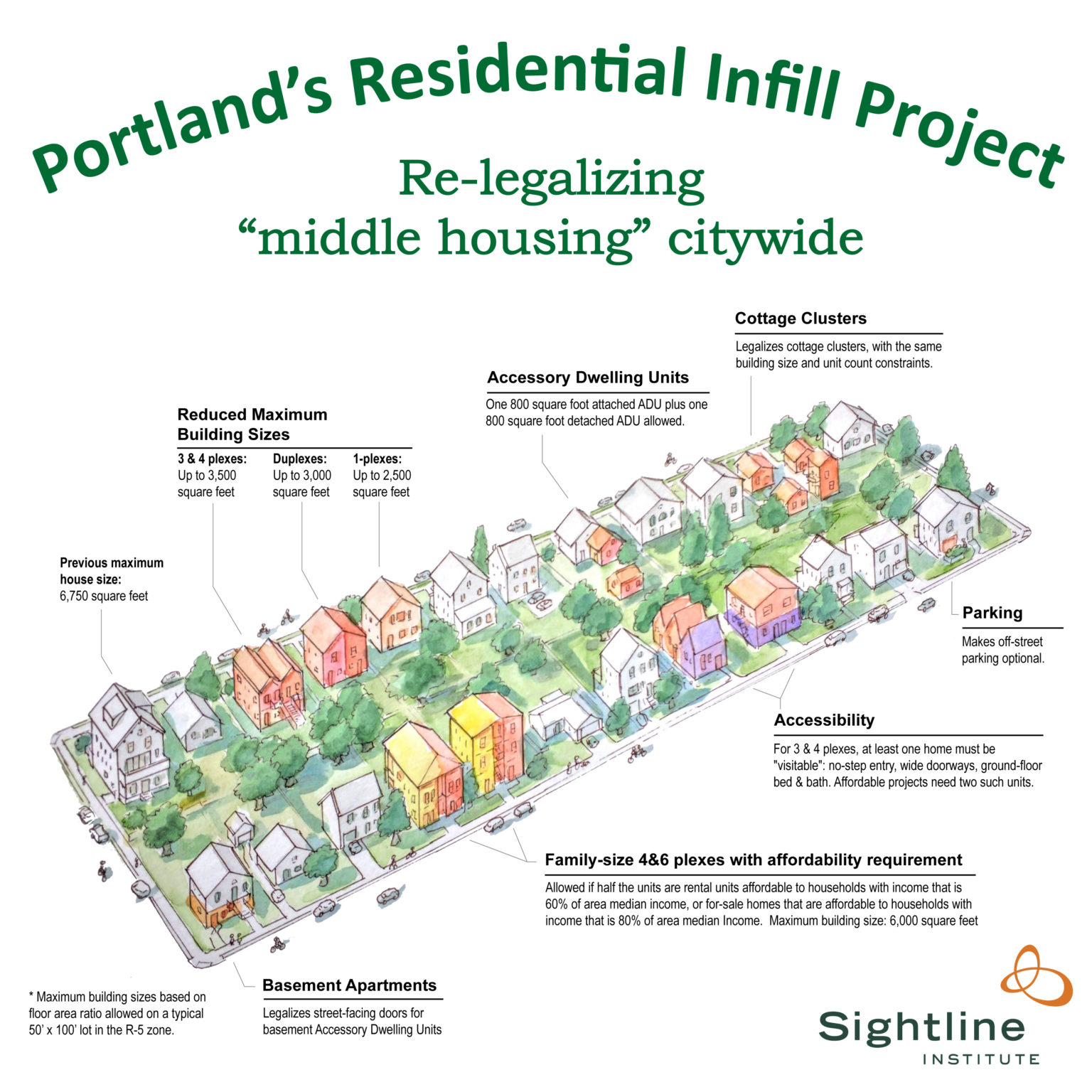The Portland Residential Infill Project is expected for approval by the Portland City Council today, culminating a six year process that became more and more ambitious with every iteration.

[Update: the Portland City Council voted to approve the residential Infill project on August 12, by 3-1 vote, according to a press release from Portland: Neighbors Welcome.]
"Portland’s city council seems certain Wednesday to set a new bar for North American housing reform by legalizing up to four homes on almost any residential lot," reports Michael Andersen.
The Residential Infill Project, the name of the package of planning and zoning reforms, is expected to pass with a 3-1 vote, after years of headlines describing the reforms proposed by the project as more controversial than they appear in the end. Planetizen has been tracking the Residential Infill Project through ups and downs and twists and turns since 2016, but Andersen traces the origin of the project back six years, to a letter by a local micro-developer.
Andersen expects the effects of the new rules to present a turning point in the history of the city. "The measure will make it viable for nonprofits to intersperse below-market housing anywhere in the city for the first time in a century."
Among the specifics of the Residential Infill Project are a “deeper affordability” option that will allow four to six homes on any lot, "if at least half are available to low-income Portlanders at regulated, affordable prices," explains Andersen.
The new rules also include big time parking regulation reform, removing parking mandates from three quarters of land zoned for residential use in the city.
All in all, Andersen says the new rules are: "the most pro-housing reform to low-density zones in US history."
The Sightline Institute is sharing this infographic, created by Alfred Twu, to illustrate the kinds of housing development legalized by the Residential Infill Project.
 Image by Alfred Twu, courtesy of the Sightline Institute.
Image by Alfred Twu, courtesy of the Sightline Institute.
Included in Andersen's in-depth article is a lot more detail about the reforms implemented by the Residential Infill Project, the evolution of the project as it made its way through the planning and political process in Portland, and a comparison of how this new planning reform compares to other recent, ambitious planning innovations implemented in cities like Minneapolis, Austin, Seattle, and Vancouver.
Finally, Andersen concludes with a call for more cities to follow Portland's example, and for the federal government to aid in that effort.
FULL STORY: ON WEDNESDAY, PORTLAND WILL PASS THE BEST LOW-DENSITY ZONING REFORM IN US HISTORY

Planetizen Federal Action Tracker
A weekly monitor of how Trump’s orders and actions are impacting planners and planning in America.

Chicago’s Ghost Rails
Just beneath the surface of the modern city lie the remnants of its expansive early 20th-century streetcar system.

San Antonio and Austin are Fusing Into one Massive Megaregion
The region spanning the two central Texas cities is growing fast, posing challenges for local infrastructure and water supplies.

Since Zion's Shuttles Went Electric “The Smog is Gone”
Visitors to Zion National Park can enjoy the canyon via the nation’s first fully electric park shuttle system.

Trump Distributing DOT Safety Funds at 1/10 Rate of Biden
Funds for Safe Streets and other transportation safety and equity programs are being held up by administrative reviews and conflicts with the Trump administration’s priorities.

German Cities Subsidize Taxis for Women Amid Wave of Violence
Free or low-cost taxi rides can help women navigate cities more safely, but critics say the programs don't address the root causes of violence against women.
Urban Design for Planners 1: Software Tools
This six-course series explores essential urban design concepts using open source software and equips planners with the tools they need to participate fully in the urban design process.
Planning for Universal Design
Learn the tools for implementing Universal Design in planning regulations.
planning NEXT
Appalachian Highlands Housing Partners
Mpact (founded as Rail~Volution)
City of Camden Redevelopment Agency
City of Astoria
City of Portland
City of Laramie





























